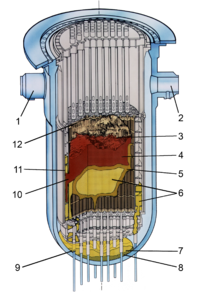
Photo from wikipedia
Abstract This paper presents data-driven methods to detect loss-of-coolant accidents (LOCAs) in the primary side of a pressurized water reactor. Process data for a variety of accident scenarios have been… Click to show full abstract
Abstract This paper presents data-driven methods to detect loss-of-coolant accidents (LOCAs) in the primary side of a pressurized water reactor. Process data for a variety of accident scenarios have been generated and collected using a generic pressurized water reactor simulator. The data have been used to train kernel density functions, which estimate nonparametric probability density functions based on training data. These density functions have then been used with Bayesian hypothesis testing and maximum likelihood estimation to detect the onset of the LOCAs and to identify where in the primary side the leaks have occurred. The methods have been able to detect the LOCAs for all scenarios tested with an average detection delay of one-seventh the time for the reactor to trip. Furthermore, the methods have been able to correctly identify the leak locations for 92.3% of the scenarios tested, with higher success rates for larger leaks.
Journal Title: Nuclear Technology
Year Published: 2018
Link to full text (if available)
Share on Social Media: Sign Up to like & get
recommendations!